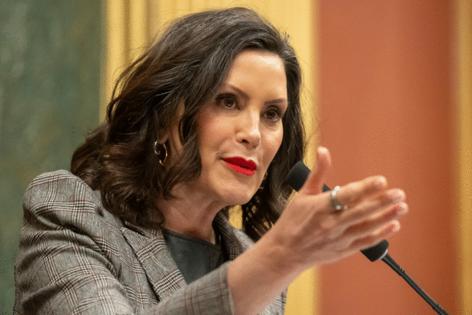Michigan Gov. Gretchen Whitmer pushes for 'strategic' tariffs in D.C. speech ahead of Trump meeting
Published in Political News
WASHINGTON — Michigan Gov. Gretchen Whitmer called for a tariff exemption for autos and energy ahead of a planned meeting Wednesday with President Donald Trump.
She made the pitch as part of a morning speech on manufacturing policy about a block from the White House.
"Let's carve out autos and energy, both of which are critical to manufacturers and directly impact people's wallets," Whitmer said.
The meeting will come as the Democratic governor navigates two crises: An ice storm that left thousands of residents in northern Michigan without power for more than a week and Trump's escalating trade war that threatens the wellbeing of the state's auto industry.
The second-term Democratic governor told journalist Gretchen Carlson that she was having a series of meetings on Wednesday and would be joined by Michigan House Speaker Matt Hall, a Republican and Trump ally.
A face-to-face conversation could be an opportunity for Whitmer to find common ground with the second-term Republican president on their shared priorities around American manufacturing, innovation and industrialization. She previously bashed Trump's tariff threats in February but has been more muted in recent weeks, even as Trump announced 25% import taxes on foreign vehicles and widespread "reciprocal tariffs" on most other goods from around the world.
"I want to talk about that. I'm going to talk about the impact of tariffs. I don't know that I'll get any— I'll get to make any ground, but I'm not going to cede the opportunity to talk about something that is important to my state," the governor said of her scheduled meeting with the president.
Whitmer described the importance of bipartisanship and taking meetings with Trump and his team to protect the interests of her state. "If you're not at the table, you're on the menu," she said.
Asked by Carlson how she would handle tariffs differently than Trump, Whitmer said, "I haven't really thought about that."
She continued: "What I have thought about, though, is tariffs are, need to be used like a scalp, not a hammer. There's a purpose to have tariffs, but the uncertainty that has now been created, the anxiety and fear, just breeds destruction."
Whitmer's meeting with Trump would be her second in less than a month, after she visited the White House on March 13 to discuss tariffs. Whitmer also sat next to Trump at a National Governors Association dinner in February, days after he reappointed her to serve on the national Council of Governors.
Prior to being interviewed by Carlson at an event venue near the White House, Whitmer gave a speech titled "Build, America, Build." In her remarks, she embraced "strategic" tariffs as a means of building back up the nation's industrial base, particularly in the ship and plane-building business.
The governor called for more such business activity in Michigan, which she said has lost good-paying manufacturing jobs for decades thanks to shortsighted trade policies.
"We know losing a factory doesn’t just mean losing jobs," she said. "Losing people means losing resources. It means fewer police officers and underfunded schools. It means less housing built and fewer roads fixed. It’s a loss of purpose and identity."
The share of U.S. workers employed in manufacturing jobs has declined for decades as businesses have moved production to countries with lower labor costs. That trend predates oft-maligned international trade accords like the 1994 North American Free Trade Agreement, or NAFTA. There have been similar trends within the United States, too.
Michigan has lost 27,600 manufacturing jobs since Whitmer became governor in January 2019, according to federal data. Across the board, Midwestern states like Ohio and Indiana have shed manufacturing jobs since that month while Southern states like Texas, Florida and Georgia have gained tens of thousands.
In another part of her speech, Whitmer discussed the "common ground" shared by Americans and Michiganians regardless of their political preferences, though she also criticized some of Trump's actions since taking office. Some of those actions include the cutting of "critical government services" and a blanket approach to trade policy that does the "opposite" of lowering the cost of living for Americans, Whitmer said.
Carlson, noting the governor's decision to give the speech in Washington rather than Michigan, asked if she was running for president.
Whitmer, whose term as governor expires in 2026, said no.
"This is similar to speeches that I've given in Michigan," Whitmer said. "This is, I think, a blueprint for success."
-----------
Staff Writer Craig Mauger contributed.
-----------
©2025 www.detroitnews.com. Visit at detroitnews.com. Distributed by Tribune Content Agency, LLC.




























































Comments